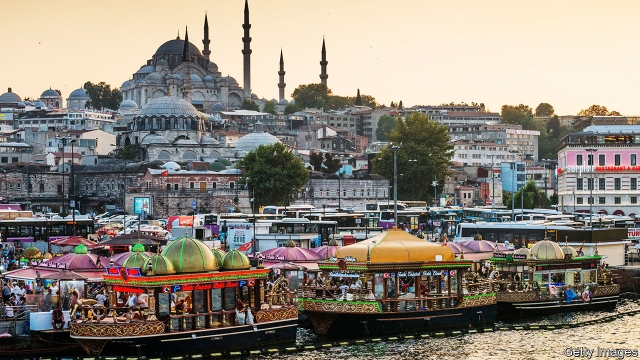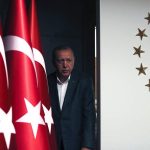Recep Tayyip Erdogan is humiliated
Over the past few years President Recep Tayyip Erdogan and his government have throttled dissent, taken control of the judiciary and defanged the press, confining what remains of Turkey’s democracy to the ballot box. In local elections on March 31st, the ballot box struck back. Despite taking a plurality of the national vote, Mr Erdogan’s ruling Justice and Development (ak) party suffered defeats in five of Turkey’s six biggest cities, including Istanbul, the country’s economic engine, and the capital, Ankara.
The loss that must have stung Mr Erdogan the most came in Istanbul, where he grew up and made his name as mayor over two decades ago. The ak’s mayoral candidate, Binali Yildirim, a former prime minister and parliamentary speaker, had the support of media run by pro-government tycoons, his party’s seemingly unstoppable electoral machine and the president, who stumped for his candidates as if his own political future were on the line. The opposition’s pick, Ekrem Imamoglu, had the backing of a hapless, squabbling party, a fraction of his opponent’s resources and only a few years of experience as district mayor under his belt. But it was Mr Imamoglu, the relative unknown, who prevailed by the thinnest of margins.
Controversy cast a cloud over the vote. As soon as Mr Yildirim’s lead over Mr Imamoglu dwindled to a mere fraction of a percentage point, the state news agency, true to its reputation as a government mouthpiece, stopped updating results from the race. It was only the next day that the head of Turkey’s electoral board confirmed that Mr Imamoglu had come out ahead by fewer than 30,000 votes. ak promptly challenged the outcome. Billboards and banners proclaiming the party’s supposed victory suddenly began to appear across the city. As The Economist went to press, the board had authorised a partial recount in several districts. Early indications were that the result of the Istanbul vote was unlikely to change.
Mr Erdogan has been able to claim overall victory. ak and its coalition partner, the Nationalist Movement Party, won in most of the country’s 81 provinces, securing a combined 52% of the popular vote in the process (ak alone received 44%). The main opposition bloc, led by the Republican People’s Party (chp), won 38%. “We have come out of this election as the leading party,” Mr Erdogan said, but conceded that ak had underperformed. He also promised to take measures to boost the economy, which recently dipped into recession, and to abide by free-market rules. The free markets did not seem reassured. Even though the preceding week had been one of its worst weeks since last summer’s currency crisis, the Turkish lira weakened immediately after the vote on fears that Mr Erdogan would continue to sacrifice economic orthodoxy for political gains. It then regained some ground.
The election is hardly a fatal blow to Mr Erdogan. Turkey’s strongman continues to enjoy sweeping executive powers. His coalition commands a parliamentary majority. But losses in the big cities hurt both symbolically and practically. Istanbul and Ankara account for a quarter of the country’s population and 40% of its gdp. Opposition mayors threaten not only to dismantle or appropriate the vast networks of patronage in municipalities run by the ak for over a decade, but also to unearth one corruption scandal after another. “Obviously this makes Erdogan weaker,” says Soli Ozel, an academic and columnist, “because the money and rent-churning machines have been captured by rivals.”
The results also place Mr Erdogan in an uncomfortable spot, squeezed between Kurdish voters, many of whom sided with the opposition alliance, and his nationalist allies. Any attempt to relaunch peace talks with the Kurdistan Workers’ Party (pkk), an armed and outlawed separatist group, could end up costing ak its majority in parliament. The nationalists “can dissolve parliament and force early general elections whenever they want”, says Emre Erdogan (no relation), an academic at Bilgi University. “This makes a Kurdish opening so much more difficult.”
A more immediate worry about the country’s political stability is whether Mr Erdogan will make good on his threats to boot some of his opponents from office, starting with Mansur Yavas of the chp, who won the Ankara race, and ending with mayors from the Peoples’ Democratic Party (hdp), who prevailed in most of the Kurdish south-east. A week before the election, Turkey’s interior minister announced that 231 opposition candidates were being investigated on terrorism charges. Prosecutors launched a probe against Mr Yavas on the basis of old claims connecting him to a forged cheque. Such threats are not taken lightly in Turkey. In the previous local elections, voters in the south-east elected 102 hdp mayors. At least 94 of them have since been sacked or arrested on suspicion of links to the pkk, and replaced by government trustees.
There is cause for some optimism, however. The vote showed that Turks still have faith in elections. Turnout reached 85%, higher than in most countries in Europe. The electoral board stood its ground, especially when it came to the Istanbul vote. At least some institutions in Turkey appear to be functioning properly.
Yet there is also considerable cause for anxiety. Throughout the election campaign Mr Erdogan accused the opposition of taking orders from terrorists, and warned hdp politicians that they had no place in Turkey. The morning after the vote, newspapers run by the president’s cronies proclaimed Mr Yildirim the victor in Istanbul. The next day, they accused the opposition of fraud. One accused it of staging a coup. Many aksupporters have accepted the results, but some seem bent on reversing the outcome of the elections by hook or by crook. Mr Erdogan appears not to have made up his mind yet. He has already divided the country. He is no longer the person to heal it—but he might want to avoid making things worse.
Source: Economist



